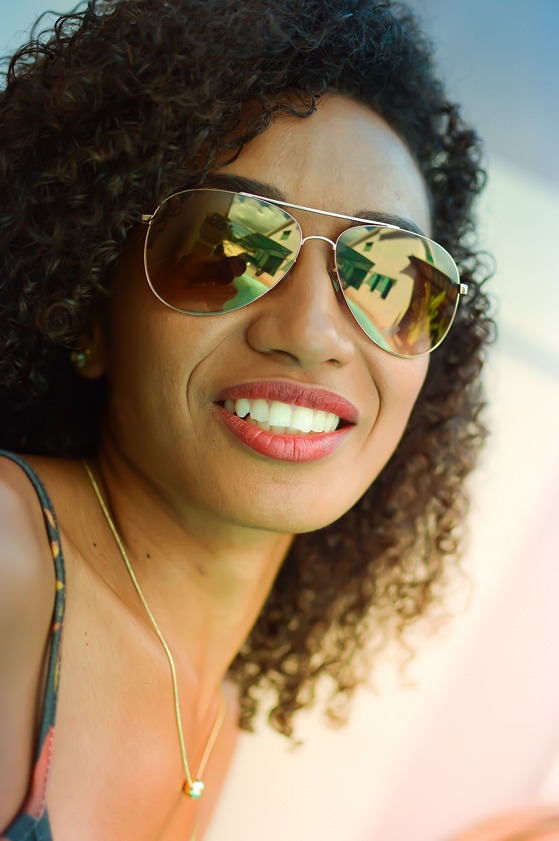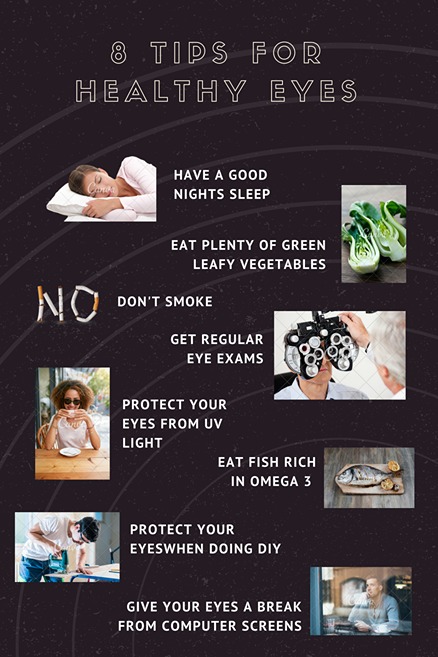How To Keep Your Eyes Healthy
It is easy in our busy lives to take our eyes for granted, but just like other parts of our body and our health in general it is worth taking a few steps or adding a few routines into our everyday activities to improve our eye health.
Many of the suggestions for improving your eye health will also have benefits for your general health from having a good night's sleep to reducing screen time. You will see that introducing just small changes can have big impacts on the health of your eyes.
If you have ever bought a puppy or a kitten you will know the importance put on healthy eyes. Almost all advice from the RSPCA or your local vet will say that a healthy puppy should have clear bright eyes with no discharge, although that may not be how we decide on healthy babies our eyes can tell a lot about a person's health.
Fortunately, keeping our eyes healthy is quite simple, many of the tips and advice are easy to carry out and in fact you are probably doing most of them already.
We have put together a list of 8 things that you can do to improve the health of your eyes and your general well-being.
Have a good night's sleep
Sleep is good for your eyes, While you sleep your eyes rest, although they do still move especially in REM sleep. They are not processing images which helps them relax, this is also a time when your eyes can restore their tears helping to prevent dry eyes throughout the day.
Eat Your Greens and Your Yellows

We are all aware of the benefits of a healthy diet, from keeping weight in check to helping to fight against infections and reducing the risk of conditions such as diabetes. A diet high in vitamins A, C and E is good for the cells in the eye, you are probably already getting enough of these, particularly if you have a varied diet including fruit, vegetables nuts and seeds. Lutein is also important for its antioxidant properties and can be found in green leafy vegetables, but for those of you who don't like eating your green then it's good to know that you can find high levels of lutein in yellow vegetables like pepper, corn and saffron. The Macular Society has a great downloadable nutrition and eye health leaflet if you want to find out more.
Quit Smoking
It's hard to get away from the fact that smoking is bad for your health, but did you know it's also bad for your eyes? Smokers double their risk of developing AMD (age-related macular degeneration) which is linked to the development of cataracts. Smoking increases free radicals, which speed up the ageing process, not just of your body and skin but also the eyes, increasing the risk of glaucoma and diabetic retinopathy.
We know quitting smoking is easier said than done but there is lots of help out there both on the high street and online. The NHS has a great 10 tips to help you quit smoking.
Get Regular Eye Exams
It is recommended that between the ages of 18 and 60 you have an eye exam every two years, whether you need glasses or not, so that your eye health can be checked and spot any changes in your eye health and vision early on. Over the age of 60 it is recommended that you have an eye exam every year. Your Optometrist may recommend shorter or longer gaps between tests. To see if you are eligible for free sight tests on the NHS check out their criteria.
Protect Your Eyes From UV Light

We are all aware of the importance of a good high SP factor sunscreen to protect our skin from harmful UVA and UVB rays but these same rays are also damaging to the eyes. Sailors, snowboarders and skiers have known for some time that the sun can cause sun or snow blindness which is due to overexposure to bright light, but everyday exposure to the harmful sun rays slowly damages our eyes and prematurely ages the eyelids and skin around the eyes. According to skin cancer.org, eyelid cancer accounts for 5-10% of all skin cancers and at least 10% of cataract cases are attributable to UV exposure.
Every time you go out in bright light, you should wear a pair of sunglasses with good UVA and UVB protection, sunglasses should not just be for sunbathing.
Eat Fish Rich In Omega 3
There have been numerous studies that show a diet high in Omega 3 is good for eye health, in particular Omega 3 is good in the treatment of dry eye syndrome and helps in the prevention of macular degeneration. A good source of Omega 3 can be found in salmon, sardines, cod, herring and mackerel to name a few, if you don't like eating much fish, there are Omega 3 supplements available
Protect Your Eyes When Doing DIY
In certain jobs and professions eye protection is advisable if not mandatory, construction, laboratory work, welding etc all require regulated eye protection. According to research at the Department of Ophthalmology and Visual Sciences at the University of Wisconsin up to 90% of workplace eye injuries could be avoided with the correct eye protection.
The risk of eye injury is not just at work, carrying out a simple DIY task at home eye protection is highly recommended, around 30,000 people every year are admitted to hospital with serious eye injuries caused whilst performing DIY tasks, whilst many more suffer superficial eye injuries not requiring medical attention.
Every year around 200,000 turn up at A&E with an eye injury that was sustained whilst carrying out home improvement projects, according to ROSPA. There were 4,313 people injured after accidents involving contact with non-powered hand tools alone over one year. Good quality protective eyewear is available quite cheaply at most outlets selling hand or electric tools.
Give Your Eyes A Break From Screen Time
We are all spending more time on our phones, tablets or laptops and this is not good for our eyes. Staring at a screen for long periods of time can cause eye strain leading to headaches, tired eyes, eye strain and dry eyes whilst the blue light emitted from our screens can cause long-term eye damage and affect our natural Circadian rhythm.
Eye care professionals recommend using the 20-20-20 rule, taking a 20-second break every 20 minutes by looking 20 feet away, to help reduce the risk of digital eye strain and limit screen time in the lead-up to bedtime.


